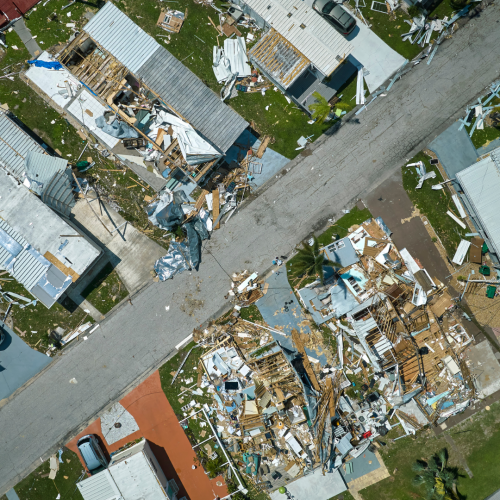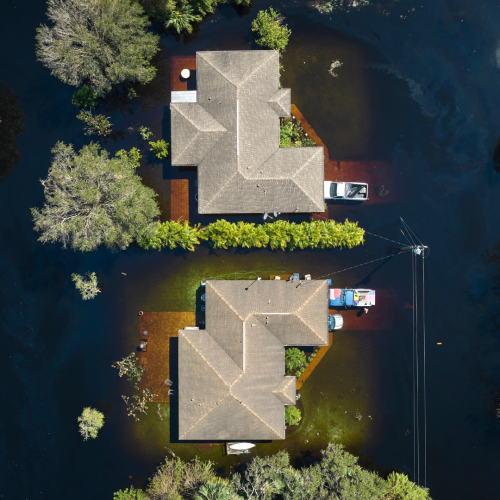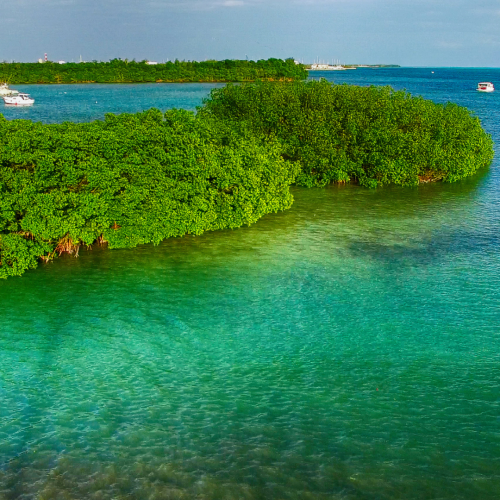Undoubtedly, Florida is on the frontlines of climate change. 2023 was the warmest year in recorded history, with July being the hottest month. Hurricane Idalia caused an estimated $3.6 billion of damage when it hit the Big Bend in August, and recovery is still underway from 2022’s catastrophic Hurricane Ian. Sea level rise is already threatening many low-elevation residences and businesses, especially when compounded by king tides and coastal subsidence.
Still, Florida has a lot of potential for both mitigating the root cause of climate change and adapting to the impacts through measures like sustainable and resilient infrastructure.
In a state where climate issues cross partisan lines, this year’s climate change legislation focuses on:
- Property Insurance
- Workplace Heat Exposure Requirements
- Flood Disclosures for Property Sales
- Saltwater Intrusion Mitigation
- Hurricane Protections
- Climate Resilience
Property Insurance
Between hurricane seasons and sea level rise, property insurance is a contentious issue in Florida. The effects of climate change are causing insurance companies to re-evaluate the risk to insured Florida properties. Since 2022, at least 12 insurance companies have stopped issuing new policies in the state, and prices are rising.
In an email to TESI, the Florida Office of Insurance Regulation (OIR) explained that catastrophic claims, higher reinsurance costs, higher-than-expected losses, and costly litigation are driving these higher prices. These costs are then passed on to consumers.

For some Floridians, insurance premiums increased by more than 40% in 2023. Combined with price hikes on monthly expenses like utility costs, climbing insurance premiums have led property owners to be priced out of their own homes.
If companies want to stay afloat by avoiding risk, they may choose to turn down coastal, damage-prone homes. Homeowners are then forced to turn to Citizens Property Insurance Corporation (Citizens), the state’s insurer of last resort. Citizens was established in 2002 by the Florida Legislature as a not-for-profit insurer, taking on homeowners who could not obtain insurance elsewhere.
Under current legislation, condominiums with at least 50% of the units being used for short term rentals (rental periods under 30 days) are ineligible for coverage under Citizens. This restriction was put in place in 2014 to limit the exposure, or the amount of risk, that Citizens would incur with a large volume of policyholders.
HB 625, sponsored by Rep. James Buchanan (R), proposes to allow eligibility for such properties at a sound and non-competitive rate that is not subject to a typical glide path, where premiums slowly increase towards a full rate. Proponents of the bill claim that it fills a gap in coverage that is pricing full-time owners and renting tourists out of Florida condos. Still, opponents worry that the bill could make Citizens “too big,” putting far too much risk on the back of one entity.
Citizens receives its funding from policyholders. But with a growing number of property owners qualifying for Citizens as an insurer of last resort, an increase in severe weather events due to climate change could threaten the organization’s financial resources.
To reduce the number of Citizens’ insured properties, OIR has a depopulation program that “allows new and existing insurance companies to assume policies currently covered by Citizens in an attempt to transfer policies back to the private insurance market,” wrote Samantha Bequer in an email to TESI.
In 2023, Bequer said OIR was able to transfer more than 650,000 policies to private insurers, an 800% increase from 2022.
The same bill would allow authorized roof inspectors to fill out a specific form to document and demonstrate the remaining life in a roof over 15 years old. The purpose of the document would be to prevent insurers from refusing to renew a homeowner’s insurance policy based on the age of the roof over 15 years old if the roof has at least 5 years of remaining life. HB 625 additionally increases the minimum loss coverage for property owners of condominium units from $2,000 to $5,000.
HB 565, introduced by Rep. Jim Mooney (R), and SB 604, introduced by Sen. Ana Maria Rodriguez (R), propose smaller edits to coverage by Citizens. Some of these changes include implementing an annual rate increase that does not exceed 10% for any single policy and not requiring flood insurance policies for properties that are at least 1 foot above the flood zone’s minimum base flood elevation.
UPDATE: HB 625 died in the Commerce Committee. SB 604 died in the Banking and Insurance Committee; HB 565 died in the Insurance and Banking Subcommittee.
Other bills related to property insurance include:
- Federal Catastrophe Pool – HM 371 (died in the Insurance and Banking Subcommittee)
- Property Insurance – SB 102 and HB 1017 (SB 102 died in the Banking and Insurance Committee; HB 1017 died in the Insurance and Banking Subcommittee)
Workplace Heat Exposure Requirements
2023 was the warmest year on record, with last summer breaking numerous heat records. And, in the U.S. outdoor workers face a disproportionate risk of heat-related illness and death.
While the Occupational Safety and Hazard Administration (OSHA) has recommendations for best practices in high temperatures, there are currently no state or federal laws that provide exposure protections for outdoor workers. Efforts to pass these types of laws have been met with resistance.
Last summer, Miami-Dade commissioners introduced a bill that required water, rest, and shade for outdoor workers on days with temperatures over a determined heat index. Pushback from agriculture and construction industries caused the bill to be deferred.
Under current legislation, local governments can require businesses to meet certain minimum wage and heat exposure requirements when taking on public contracts. Cities and counties like Gainesville and Miami-Dade have custom requirements like these in place already.
Now, HB 433, sponsored by Rep. Tiffany Esposito (R), aims to prevent, or preempt, local governments from setting workplace heat or minimum wage requirements. In simple terms, preemption allows the state government to prevent lower governments, such as city or county governments, from regulating these issues themselves. If passed, local governments would have to revert their current requirements to meet state or federal standards. Currently, no such standards exist.
UPDATE: HB 433 was enrolled, meaning it was approved by both the House and Senate and sent to Governor DeSantis for approval.
Flood Disclosures for Property Sales
Due to rising sea levels and intense storms, it has become especially important for Floridians and prospective residents to recognize their flood risk. Many states, including Texas, Louisiana, Mississippi, and South Carolina, have statewide laws that require flood history and risk of a property to be disclosed to a buyer before it can be sold. Still, in flood-prone Florida, no such legislation has been passed so far.

SB 484, sponsored by Sen. Jennifer Bradley (R), as well as HB 1049, sponsored by Rep. Christine Hunschofsky (D), would require sellers to disclose certain flood risks in writing to a prospective buyer before the sale can occur. These risks include whether the property has been flooded by river or tidal overflows or excessive rain events, whether the property is in a FEMA-designated flood hazard zone, or if the property owner has had to make a flood-related insurance claim in the past.
SB 38, sponsored by Sen. Linda Stewart (D), and HB 1119, sponsored by Rep. Bruce Antone (D), would require landlords to make similar disclosures to renters. Prospective residents would be notified before entering their lease agreement, and current residents would be updated on any changes in their unit’s flood zone designation. While fewer states require these disclosures for renters, Texas already has similar legislation in place.
Proponents of flood disclosure policies claim that the warning is important for public safety, especially for those who are new to Florida. Opponents worry that the legislation will devalue property in areas that receive frequent floods, making coastal land difficult to sell.
UPDATE: SB 484 was laid on the table, which means it was set aside and died at the end of the session – however, its companion bill HB 1049 was enrolled and sent to Governor DeSantis for approval. HB 1119 died in the Civil Justice Subcommittee; SB 38 died in the Judiciary Committee.
Saltwater Intrusion
From its ocean views to its freshwater springs and lakes, Florida is known for its water. But what happens when salty seawater creeps inland?
Floridians get their water from aquifers, natural underground stores of fresh water sitting among layers of rock and limestone. Both manmade wells and century-old springs provide fresh water from aquifers, including the deep statewide Floridan aquifer and the shallow Biscayne aquifer, which is more localized to South Florida.
When coastal communities draw heavily from the state’s aquifers, salty ocean water can pour into the empty spaces before the fresh water recharges. This is called saltwater intrusion. Sea level rise and storm surges add additional force to the salt water.
SB 298, sponsored by Sen. Tina Polsky (D), would authorize the Florida Department of Environmental Protection (DEP) to provide grants for saltwater intrusion vulnerability assessments in coastal counties. Assessments would cover the effects of saltwater intrusion on water supplies and a community’s preparedness to respond to such a threat. Data from these studies would be made publicly available and used to update existing flood vulnerability and sea level rise datasets.
HB 1079, introduced by Rep. Fiona McFarland (R), would also authorize saltwater intrusion vulnerability assessment grants from the DEP. However, the bill takes a different approach by additionally preventing the DEP from delegating coastal construction and building codes, leaving that responsibility to the Coastal Construction Control Line Program (CCCL). Florida’s CCCL program, established in 1989 by the DEP, regulates coastal structures and activities to ensure that they do not erode the shore, destabilize dunes, or interfere with flora and fauna such as sea turtles.
Holly Abeels, Florida Sea Grant Extension Agent with the University of Florida IFAS Extension Office in Brevard County, says that data from these saltwater intrusion vulnerability assessments could be important for our knowledge of flood vulnerability and sea level rise.
“I don’t think we know enough, so if there is more funding that can go towards science, it’s definitely needed,” Abeels said.
“Saltwater intrusion is not well understood, and in some areas, it’s more noticeable, like in Southeast Florida. It would be great to learn how the rest of the state might be affected by it.”
UPDATE: SB 298 died in Messages; HB 1079 died in the Agriculture and Natural Resource Appropriations Subcommittee.
Hurricane Protections
Currently, homeowners’ associations, or HOAs, have no legal requirement to adopt hurricane protection specifications for residents. While it is illegal for HOAs to refuse property owners’ requests to install shutters that comply with applicable building codes and external appearance preferences, other hurricane protections are not universally required.
After barrages of extreme weather events in the past years, HB 293, sponsored by Rep. Tyler Sirois (R), would require Florida HOAs to adopt hurricane protection specifications. HOAs would be free to specify a preference in color or style, but the protections must meet applicable building codes. Hurricane protections could include metal roofs, shutters, impact-resistant windows and doors, reinforced garage doors, erosion controls, exterior fixed generators, and fuel storage tanks.
In compliance with new specifications, HOAs could require residents to improve their hurricane protections, at least by outward appearance, to fit the neighborhood’s scheme. However, the HOA could not deny property owners hurricane protections if they comply with color and style specifications.
UPDATE: HB 293 was enrolled, meaning it was approved by both the House and Senate and sent to Governor DeSantis for approval.
Climate Resilience
The term “climate resilience” refers to our ability to prevent, withstand, respond to, and recover from climate change issues. Some may separate the priorities of climate resilience into two categories: mitigation and adaptation.
Mitigation is an approach that aims to reduce the causes of climate change. Because climate change is caused by excess carbon emissions from human use of non-renewable energy, reducing our emissions is a mitigation approach. Nature naturally mitigates carbon emissions through carbon sequestration, or the capture and storage of atmospheric carbon in what is known as a “carbon sink.” Some examples of natural carbon sinks include forests, soils, swamps, mangroves, and the ocean.
Adaptation is an approach that attempts to reduce the risk from the effects of climate change. Hotter temperatures and extreme weather from climate change threaten to damage natural resources we rely on, such as drinking water and fisheries. Funding better protection of these resources is an example of an adaptation strategy.
Climate resilience is made up of mitigation and adaptation strategies that aim to protect human life, natural resources, and the environments we live in. The protection of terrestrial and aquatic ecosystems is critical for our resilience to climate change.
Both SB 1630, sponsored by Sen. Vic Torres (D), and HB 1531, sponsored by Rep. Dotie Joseph (D), propose the creation of the Blue Communities program, OSCAR grant fund, and a special account for the protection of marine resources. All three programs aim to leverage financial incentives towards climate resilience research and implementation.
The Blue Communities program would provide technical and financial assistance via grants and loans to local governments who qualify. To qualify as a Blue Community, a local government would need to adopt at least five initiatives from a list of plans, such as a liquid hazardous waste management program, groundwater protection regulation, water conservation ordinance, shellfish or seagrass restoration program, water quality monitoring system, or stormwater utility program just to name a few.
Abeels emphasizes the importance and success of local governments involving communities in conservation and climate efforts.
“Communities can tell governments where they’re seeing problems. If they’re seeing more flooding in their streets, or if it’s really hot in the summertime, or if there could be more trees for shade. Community members can be a really good resource for gathering information on the priorities that the community sees,” Abeels said.
The proposed Ocean State Climate Adaptation and Resilience (OSCAR) Grant Fund would be administered by the DEP and aims to fund projects that address climate change impacts. Prioritized projects would include coastal habitat restoration, water quality improvements, and protection of endangered fish and wildlife without inhibiting public access to public land.

The Ocean Stewardship Special Account (SB 1630) and the Marine Resources Conservation Account (HB 1531) are both sustainable funding sources meant to benefit sensitive marine ecosystems and fisheries. Both accounts would receive funding from grants, donations, and revenues from state land or equipment leases. Either account, if the legislation was passed, would be administered by the Florida Fish and Wildlife Conservation Commission (FWC). The popularity of marine ecotourism in Florida makes it particularly important for aquatic resources to be protected from human-caused degradation and kept pristine for future generations to enjoy.
SB 1630 additionally proposes the formation of a Carbon Sequestration Advisory Council within the Department of Agriculture and Consumer Services. This council would have a primary role in assessing agricultural lands for their potential as a carbon sink, or how viable the land is to store carbon and prevent it from being released into our atmosphere. Research would quantify and verify the amount of possible sequestration, after which the council would make recommendations for best stewardship practices and possibly advise the implementation of a carbon credits system.
HB 1531 also proposes a closer monitoring process for drinking water standards, specifically for per- and polyfluoroalkyl substances, or PFAS. These substances are widely used and slow to break down, giving them their colloquial name as “forever chemicals.” Some studies show that exposure to high concentrations of these chemicals may have harmful impacts on humans and animals. If passed, community water systems would be sampled for PFAS concentrations. If the system contains PFAS above the maximum allowable concentration, the water source will continue to be monitored annually.
SB 1258, sponsored by Ana Maria Rodriquez (R), and HB 1187, sponsored by Lindsay Cross (D), consider methods of increasing carbon sequestration in our state by assessing the ecosystem services of terrestrial and aquatic environments. The bill creates the Carbon Sequestration Task Force adjunct to DEP to recommend statewide development of carbon sequestration projects and short- and long-term timelines for such projects. If passed, the Carbon Sequestration Task Force would appoint representatives from several different areas of expertise, including the University of Florida Institute of Food and Agricultural Sciences (IFAS) and Florida Sea Grant.
Abeels explains that Florida ecosystems are vital to mitigating carbon emissions.
“A carbon sink is anything that would take carbon out of the atmosphere. Often, people think of things like trees, but actually, our coastal ecosystems like mangroves and salt marshes store even more carbon,” she said.
“I would think that if we want to increase carbon sequestration across the state, we need to look at the ecosystems that provide the best bang for our buck and start conserving those.”
UPDATE: SB 1630 died in the Environment and Natural Resources Committee; HB 1531 died in the Water Quality, Supply, and Treatment Subcommittee. SB 1258 died in the Appropriations Committee on Agriculture, Environment, and General Environment; HB 1187 died in the Agriculture and Natural Resources Appropriations Subcommittee.